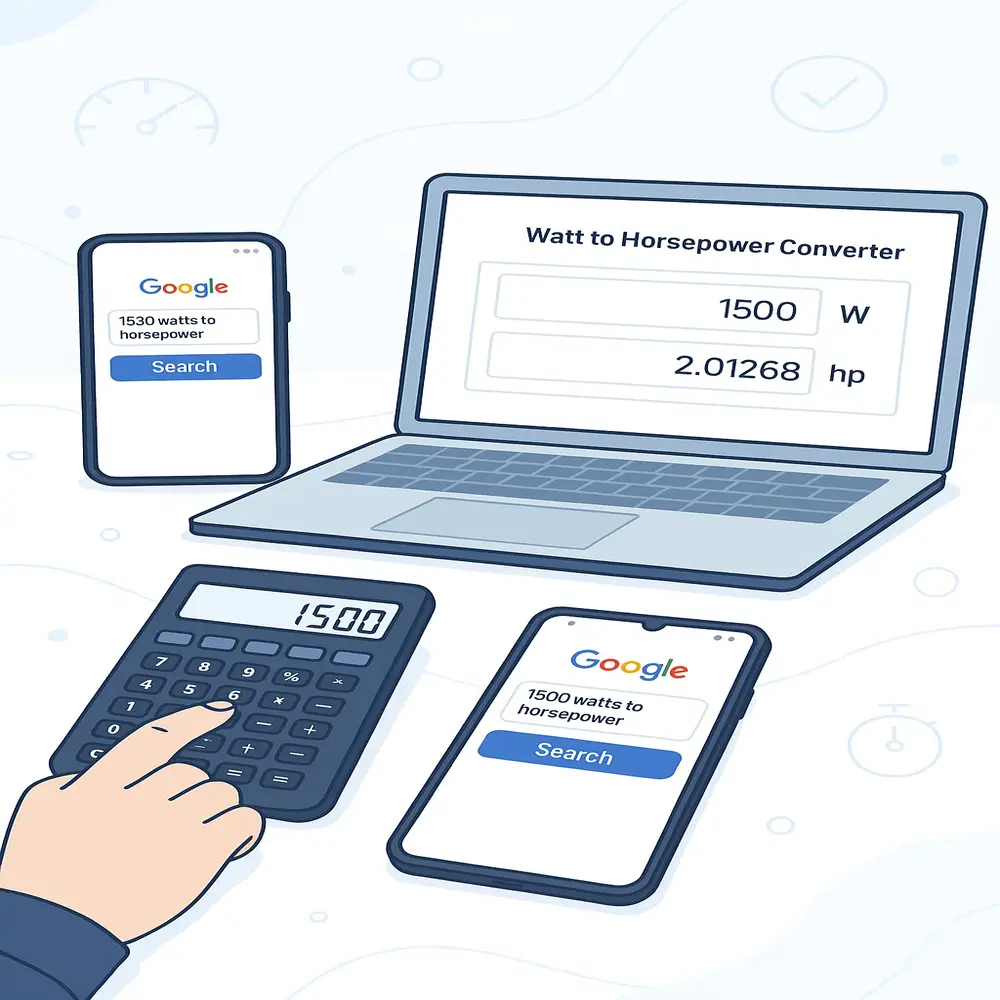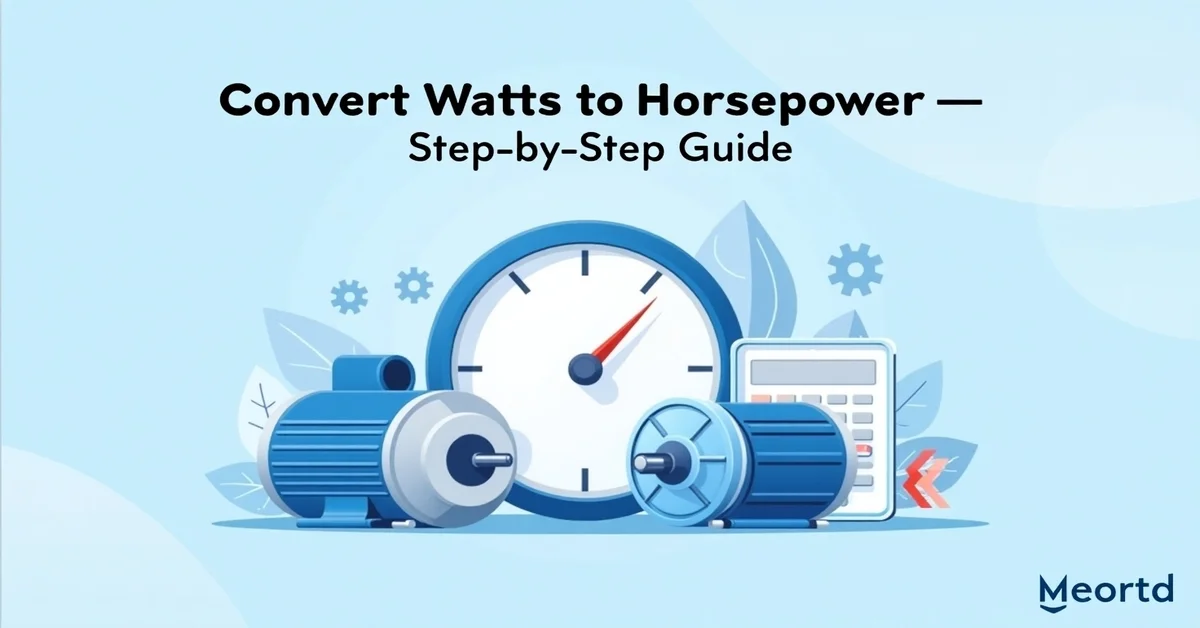Understanding how to convert watts to horsepower is useful when working with machines, motors, or energy systems. While both units measure power, they are used in different regions and settings. This guide simplifies the conversion process, explaining the concepts, formulas, and practical uses for everyday and professional needs.
What is a Watt?
A watt (symbol: W) is the unit of power in the International System of Units (SI). It refers to the speed at which energy is consumed or generated in a system. In simple words, power in watts tells you how fast work is done.
- 1 watt = 1 joule per second
- It is commonly used in electrical systems, appliances, and lighting
For example, a 100-watt bulb uses 100 joules of energy per second. If you have a motor rated at 2000 watts, it tells you how much power it delivers continuously.
What is Horsepower (HP)?
Horsepower (HP) is another unit of power, but it’s more commonly used in mechanical and automotive systems. It was originally developed to measure the power of steam engines, comparing them to horses.
There are different types of horsepower:
- Mechanical horsepower (typically used in the United States) is defined as 1 HP equal to 745.7 watts.
- Metric horsepower (common in Europe): 1 HP = 735.5 watts
- Electrical horsepower, mainly applied to electric motors, equals 746 watts per 1 HP.
For simplicity, most general calculations use mechanical horsepower (745.7 watts) unless stated otherwise.
Why Convert Watts to HP?
There are multiple situations where converting watts into horsepower becomes essential:
- You’re comparing an electric motor’s power rating (in watts) to a gas engine’s rating (in HP)
- You’re working with machinery specifications that use both units
- You want to understand the real-world power output of a system
- You’re designing or troubleshooting equipment
Regardless of the scenario, understanding the correct conversion method enables you to make informed and accurate decisions.
The Formula to Convert Watts to HP
The standard formula for converting watts to mechanical horsepower is as follows:
- Horsepower (HP) = Watts ÷ 745.7
If you’re working with metric horsepower, then:
- Metric HP = Watts ÷ 735.5
Let’s look at a few examples to make this clear.
Step-by-Step Example Conversion
Let’s say you have a motor rated at 1500 watts, and you want to find out how many horsepower that equals.
Step 1: Identify your watt value
You know the motor is 1500 watts.
Step 2: Use the mechanical HP formula
- Divide the watts by 745.7.
- 1500 ÷ 745.7 = 2.01 HP
So, a 1500-watt motor gives around 2.01 mechanical HP.
Step 3: Use the metric HP formula (optional)
- 1500 ÷ 735.5 = 2.04 HP (metric)
Both conversions are valid; it simply depends on the specific horsepower standard being applied. It’s important to confirm whether you’re working with metric or mechanical HP in your case.
Using a Calculator or Online Tool
If you don’t prefer manual calculation, you can choose from several convenient alternatives:
- Use a scientific calculator
- Use online conversion tools
- Use Google search: Type “1500 watts to horsepower” and get instant results

This is helpful when working on the go or doing multiple conversions at once.
Convert HP Back to Watts
You can also convert horsepower values back into watts using a reverse calculation. Here’s the reverse formula:
- Watts = Horsepower × 745.7
Example: If a machine has 5 HP,
- 5 × 745.7 = 3728.5 watts
So the machine delivers about 3728.5 watts of power.
Common Watt to HP Conversions
You’ll frequently encounter the following watt-to-horsepower conversion values:
| Watts | Mechanical HP | Metric HP |
| 500 | 0.67 | 0.68 |
| 1000 | 1.34 | 1.36 |
| 1500 | 2.01 | 2.04 |
| 2000 | 2.68 | 2.72 |
| 3000 | 4.02 | 4.08 |
| 5000 | 6.70 | 6.80 |
These numbers help when estimating motor sizes and comparing equipment specs.
Practical Use Cases
Let’s look at real-life scenarios where converting watts to HP is helpful:
- Home workshops: If you’re buying a table saw or air compressor, the label may show power in watts. You can convert to HP to compare with other tools.
- Automotive work: Electric vehicles may list their motor output in kilowatts. You can convert that to HP to compare with gas-powered cars.
- Industrial machinery: Engineers use HP ratings when sizing pumps, blowers, or motors. Knowing how to switch between units ensures you pick the right equipment.
- Academic and training: If you’re a student or in training for technical roles, this is a basic skill you’ll need in mechanical or electrical fields.
Tips to Remember
Here are some quick tips to make watt-to-HP conversions easier:
- Identify the required HP type: mechanical, metric, or electrical, before converting.
- Use 745.7 as the conversion factor for mechanical HP, unless specified otherwise.
- Use 735.5 for metric HP in European contexts
- Use 746 for electric HP if you’re dealing with motor efficiency
Power and Efficiency
Keep in mind, not all power gets converted efficiently. Motors and machines often lose some energy due to heat or friction.
For example:
A motor rated at 1500 watts might deliver less useful power if it’s only 85% efficient
To find usable output, multiply by efficiency:
- Usable Power = 1500 × 0.85 = 1275 watts
- Then you can convert this usable power to HP.
- 1275 ÷ 745.7 = 1.71 HP
Efficiency matters, especially in professional environments.
Final Thoughts
Converting watts to horsepower helps you easily understand power ratings across machines and systems. Whether for engineering, home, or industrial use, it’s a practical skill. Just use the formula HP = watts ÷ 745.7, check the correct HP type, and consider efficiency. With this knowledge, you can make accurate and informed decisions about power conversions.



